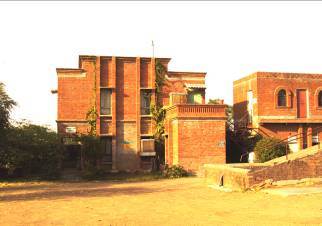|
Material Testing Laboratory
(Datia) T he Material Testing Laboratory at TARAgram Datia is one of the pilot initiatives of Technology and Action for Rural Advancement (TARA) to establish a state of the art facility in Central India. It is engaged in research of all kinds of waste generated by various industries such as fly ash, boiler ash, marble sludge etc. It commenced its operations under the flagship of TARA Environment Monitoring Facilities on the 18th of April, 2000. The laboratory is situated on the Gwalior- Jhansi National Highway at the 67th km milestone near Datia, Madhya Pradesh.It is the one and only Research and Development (R&D) Centre in India addressing and servicing the exclusive needs of the Indian Brick Industry. The Centre is managed by a team of qualified professionals. A ceramic engineer is in charge of all material testing supported by a team of BSc chemistry degree holders. Another qualified material technologist with experience in product development, materials testing and production research looks after the brick sector of the R&D process. The entire R&D team is led by the Programme Director, Dr. Soumen Maity. Infrastructure facilities available at the Material Testing Lab: • Testing facilities for soil,
green and fired bricks and fuel ash. • Demonstration of improved methods for soil storage and handling, mix preparation, firing and performance monitoring. • Balanced mechanisation to ensure easy handling of green bricks at each and every step of the production process. • Production facilities for demonstrating state of the art systems and resultant high quality green bricks, fired bricks, fuel ash bricks (cured block) and other specialty products like potteries, designer bricks, tiles etc. • Skilled manpower in terms of R&D, problem analysis, consultancy services, state of the art firing and fly ash brick production. • Training facilities for masons, moulders, extruder operators and fire masters. Other facilities available are as follows: a. Hardware: Four shaft VSBK, extruder system, semi mechanised green brick making, pug mill, brick lifting system, metallic R&D shaft, fly ash brick making production yard, drying sheds and handling equipment, brick bank, materials testing laboratory with soil, fuel ash and fuel testing facilities. b. Software: All programmes relevant to scientific documentation and DTP. c. Support facilities: • Training hall • High temperature programmable Nabertherm furnace • Electrical drier • Bomb calorimeter • Compression testing machine • Environmental monitoring equipment • Temperature sensors and scanners • Infra-red temperature measurement devices • All types of soil and fuel ash testing equipment Ever since it started functioning, it has innovated some excellent technologies and processes: • Technology for industrial
waste utilisation (5% to 70%) in brick making with varied soils. • Technology for producing hollow bricks (upto 14%). • Technology for coal ash utilisation in brick making. • Technology for making bricks with black cotton soil. • Technology for making bricks with non plastic sandy soils. • Process for ensuring the brick production unit as a "no waste producing" unit. • Low cost soil mixing techniques and equipments • Low cost extruders bricks. • Optimisation of drying time and fire schedule for various brick types • Low cost building material technologies and processes • Kits for field testing of soil and fly ash to determine suitability for brick making • Kits for field testing of coal for brick production • Repository of over 1000 soil and fuel reference samples from the entire country and also from South Asia and Africa • Technology for utilisation of slag waste in pavers production • Fly ash brick technology package • Technology for utilisation of pond ash in cured block making • Technology for utilisation of fly ash in Micro Concrete Roofing (MCR) tiles production • Technology for utilisation of black ash in cured block making • Technology for utilisation of marble sludge in brick making with various soils and also in cured products. q Sarthak Kulia
|
